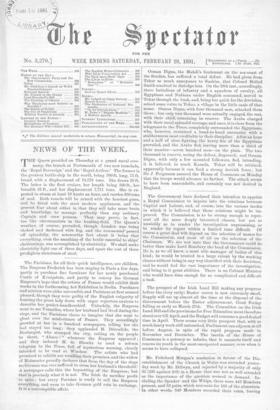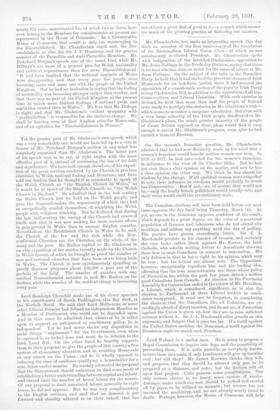Mr. Pritchard Morgan's resolution in favour of the Dis- establishment
of the Church in Wales was seconded yester- day week by Mr. Dillwyn, and rejected by a majority of only 32 (235 against 203) in a House that was not as well attended as the importance of the question seemed to demand. In- cluding the Speaker and the Whips, there were 443 Members present, and 53 pairs, which accounts for 106 of the absentees. In other words, 549 Members recorded their votes, leaving
nearly 121 votes unaccounted for, of which two or three, how- ever, belong to the Members for constituencies at present un- represented in the House of Commons. In a Conservative House of Commons, that result is only too encouraging to the Disestablishers. Mr. Chamberlain voted with the Dia. establishers, as also did Sir J. P. Hennessy, and the greater number of the Parnellite and Anti-Parnellite Members. Mr. Pritchard Morgan's speech was of Oa usual kind, while Mr. Dill wyn's was more of a general plea for Welsh nationality and political separateness than for mere Disestablishment. 'It had been implied that the national instincts of Wales were disappearing, and that every year the people were becoming more and more one with the people of the United Kingdom. But he had no hesitation in saying that the feeling of nationality was becoming stronger rather than weaker, and that there was no part of the United Kingdom at the present time in which more distinct feelings of national pride and aspiration existed than in Wales." We fear that Mr. Dillwyn is right, and that Mr. Gladstone's evident sympathy with " particularism " is responsible for the ominous change. We shall be hearing soon of East Anglian cries for Home-rule, and of an agitation for " Disestablishment in Wessex."







































